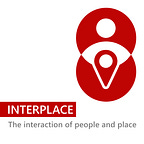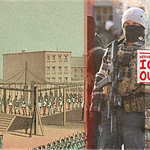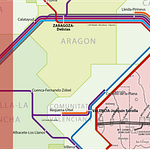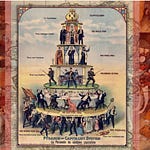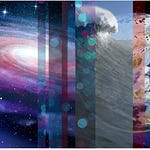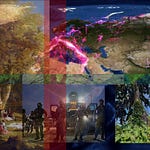Hello Interactors,
Our family got sucked into watching the Amazon Prime show, Clarkson’s Farm. As a suburban Iowa boy who knew just enough farmers to know how hard it is, I found this show relatable. Apart from the entertaining allure of many staged reality shows, I realized it also highlights topics I investigate here on Interplace. Especially the interaction of the ‘rural’ and ‘urban’…or lack thereof.
Let me know in the comments if you’ve watched this show and what you think!
I’ll be taking a little break from writing in the coming weeks and will return in September.
Until then, let’s go!
THE RURAL-URBAN DIVIDE
My son is a car guy. As such, he turned our family onto the pied piper of car guys, the British journalist turned media celebrity, Jeremy Clarkson. Clarkson is most known for his part in the shows ‘Top Gear’ and ‘The Grand Tour’ but has turned his attention to farming in recent years complete with his own show called "Clarkson's Farm." It’s a simple yet complicated narrative that unfurls like the intricate English countryside hedgerows he commissioned for his farm in an episode we watched recently.
The show chronicles Jeremy, a controversial climate change denying fossil fuel lover who expresses glee at polluting the natural environment, fulfilling a fantasy of becoming a farmer. A city boy naively embarking on a journey to become a farm boy. “How hard can this be?”, he insinuates, as his hired companion, Kaleb, a true farm boy, continually saves him from one disaster after another. Kaleb left the show earlier this year to help the Royal Agricultural University teach young people how to farm. A move that appears to be motivated by what Jeremy’s farm manager called his ‘stupidest idea yet’ – to raise pigs.
Clarkson is comfortable with stupid ideas leading to disasters having been sued, fired, and defamed on countless occasions for making racist, misogynistic, and other statements in bad taste while joyfully wallowing in the attention, fame, and revenue that comes in the aftermath. An enigmatic media magnet with sociopathic tendencies.
But I’m finding Clarkson’s Farm oddly intriguing as a snapshot of the interaction of people and place. It weaves threads of common human endeavors, the natural environment, and the evolving rhythms of modern society. He, and the show’s producers, intertwine personal, social, political, and environment struggles like meandering streams of the show’s British rural landscape. Clarkson is a bit like the menacing disease spreading badger featured in another episode – a curious creature exploring and exploiting the winding lanes and hidden corners of a quiet countryside. Both a bane and a boon. A nuisance and a neighbor.
His show also echoes intriguing themes explored among urban and rural geographers alike.1 They, like Clarkson, are playing with what it means to blend the rural with the urban. Jeremy's personal, social, and political journey within the pastoral tapestry of the Cotswold’s north of Oxford is interwoven with the ecosystems found in the mosaic of fields, woodlands, and waterways that define its countryside. A strand of a larger tapestry that challenges, like Jeremy has, the notion of rural and urban in the growing urbanization of our planet.
Planetary urbanization, as a thesis, has drawn scrutiny among some critical human geographers who call for a profound shift in the approach to understanding 'urban' and 'rural' spaces on a global scale. The origins of planetary urbanization can be traced back to Henri Lefebvre's pioneering hypothesis, first introduced in his 1970 work "The Urban Revolution" suggesting society has undergone complete urbanization. He subsequently furthered the notion that globalization has created a complete integration and interdependence of urban and non-urban spaces each with their own boundaries and borders.
Jeremy's agricultural odyssey unfolds in this realm where these distinctions of ‘rural’ and ‘urban’ become pronounced as Jeremy’s lack of comfort and knowledge of the ‘rural’ is set against the younger Caleb’s lack of experience and familiarity of the ‘urban’. The show attempts to script a blurring and harmonizing of the ‘urban’ and the ‘rural’ only to be foiled by the unrelenting rhythm of uncertainty and emergent behavior of human and non-human nature – including a global pandemic, local politics, and global and local economics.
Clarkson’s Farm, and the concept of planetary urbanization, is challenged by the spatial boundary urbanization has artificially created. It legitimizes Lefebvre's proposition that urbanization extends far beyond traditional urban centers, suggesting that rural spaces, as well as elements such as wilderness areas, oceans, the atmosphere, and even the planetary sub-surface, contribute to a global urban fabric. After all, anyone in the world can go to Jeremy’s website to buy his food products and swag.
But the show also raises questions about the specificity and boundaries of the 'urban' and underscores the need for a renewed urban theory that transcends the traditional confines of ‘us’ and ‘them’, ‘country’ and ‘city’, or ‘rural’ and ‘urban’. Scholars have raised concerns about the potential intellectual colonization and methodological biases inherent in theories of planetary urbanization. Particularly, the erasure of the 'rural' in socio-political power and in this theoretical framework has lead to 'rural' becoming a marginalized category.
Indeed, Jeremy does his fair bit of this in the show where he frequently looks down his nose at Kaleb’s lack of exposure to more ‘sophisticated’ urban culture. Meanwhile, Kaleb is not shy about looking down his nose at Jeremy for his lack of exposure to more ‘sophisticated’ rural culture. But ultimate, Jeremy – and by extension ‘urban’ culture – wield the most power and influence over the world and people like Kaleb. Just as ‘urban’ research and theories dominate academia, the media, and public culture.
BLURRING BORDERS
Critics contend planetary urbanization’s exclusive focus on the urban sphere risks overshadowing the critical importance of rural spaces as nodes in global networks of resource provisioning. Post-colonial scholars highlight the dangers of perpetuating colonialist narratives by centering solely on urban processes and ignoring the rich histories and contributions of rural societies.
"Clarkson's Farm" and the planetary urbanization thesis, rooted in the ideas of Lefebvre, becomes like the bordered farm properties in the show, with blotches of natural occurring landscapes, networks of roads mingling with streams each flowing through the countryside. Just as theories of planetary urbanization seek to uncover the power dynamics and class struggles that shape our urban and rural landscapes while also perpetuating them, Jeremy's farming journey does the same.
While planetary urbanization has led to many insights, its grounding in neo-Marxist political economy has also led to a certain reductionism. It neglects the rich interplay of life and agency found in species beyond humans in dimensions that extend beyond the surface of the earth into the atmosphere and below the ground. This exclusion stems from a perspective that normalizes and justifies the slow creep of urbanism that further entrenches artificial boundaries with the rural.
This fusion offers yet another lens into Clarkson’s farm that reveals the delicate balance between individual actions of Jeremy and other human actors, livestock and other animal actors, plants and other organism actors, the weather and other atmospheric actors, and the soil and other chemical actors. Each of which contributes and reacts to unfolding and unpredictable systemic behavior creating an intricate weave of complex adaptive systems.
In our acceptance of reductionist thinking, we may inadvertently be overlooking the holistic potential of planetary thinking. Planetary thinking extends beyond human interactions on the Earth's surface, embracing verticality and encompassing not only terrestrial but also atmospheric and subterranean connections.
The ideology more aligned with this perspective comes from the French philosopher’s Deleuze and Latour. Their ideas offer a contrasting perspective that challenges the boundaries between human and non-human, urban and rural. Just as Lefebvre's thesis emphasizes the societal shift toward complete urbanization, the Deleuzian and Latourian lens blurs these distinctions entirely arguing everything is constantly changing and evolving and everything is connected, with no clear boundaries between humans and non-humans. In the interplay between these ideologies, we find a dance—a dance that mirrors the shifting, and often awkward, patterns of human-world interaction observed in "Clarkson's Farm."
Geography and sociology researchers Nigel Clark and Bronislaw Szerszynski at Lancaster University introduce the term 'planetary multiplicity' to describe a planet capable of self-transformation influenced by the interactions of these blurred external forces. They argue that in the wake of unyielding forest fires, rising seas, the changing composition of soil, water, and atmosphere, and even altered adaptation of species, that the planet is being forced to transform itself in multiple ways – and in ways we human’s may not be accustomed to or able to control. This reminds me of Jeremy, a man of wealth, privilege, and control, forced to deal with an unyielding multitude of natural and human-made external forces in ways he may not be accustomed to…or able to control.
For me, “Clarkson's Farm" has transformed from a mere show about a controversial but entertaining car journalist into a thought-provoking journey — a proxy for some of the academic insights describing real-world complexities I find myself drawn to. It's a well filmed and produced journey that invites us to the beautiful but complex British countryside – invariably traversing beyond Jeremy’s crooked farm rows and groomed hedges, to venture into realms that echo the timeless wonders of rural life.
As we meander through the countryside of nosey neighbor narratives, local politics, and the drama of farm life – all in the comfort of a Land Rover or Lamborghini tractor – I’m reminded, in multiple interdependent ways, that despite the intricate pretense of a choreographed TV show, we exist individually as but a small part of a larger vibrant ecosystem that is ever-evolving, ever-surprising, and ever-enchanting. But collectively, especially as urban masses, we are no doubt a large part of an ever-increasing, ever-consuming, and ever-uncertain outsized geological and atmospheric force.
Meanwhile, mainstream society, like Clarkson, remain fixed in reductionist thinking that continues to empower a few in the name of exploitation and marginalization of many. Kaleb left the show to be a dad and help teach young farmers while Jeremy attempts to continue to leverage his money, power, and influence in his fantasy of jumping over the imagined border of an urban elite to an everyday farmer. But maybe by exposing the world to rural life, Jeremy inadvertently demonstrated just how interconnected we all are with the world.
Planetary rural geographies. Chi-Mao Wang, Damian Maye, Michael Woods. Dialogues in Human Geography. 2023.
Planetary Social Thought : The Anthropocene Challenge to the Social Sciences. Nigel Clark and Bronislaw Szerszynski. 2021.

